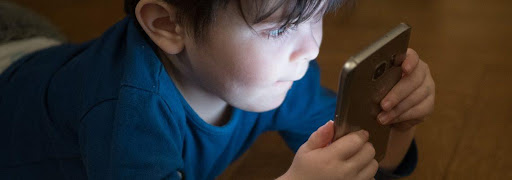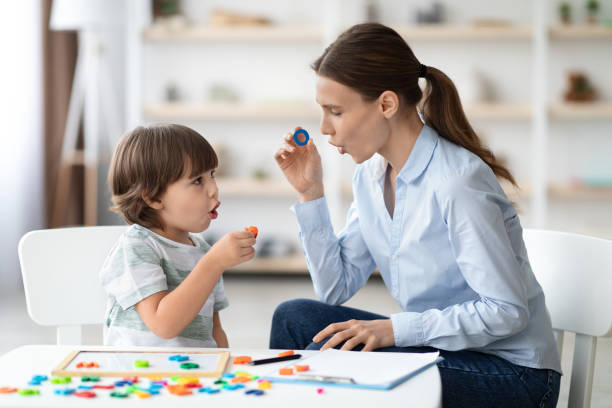Newsletter
Subscribe to stay updated on our latest news, upcoming workshops, training and special offers

It’s not a secret that kids are more hooked on technology than ever before. Digital media use is a growing problem as more and more children spend large amounts of time on smartphones and tablets. They may be so attached to their technology that they struggle to concentrate on anything else.
Yes, I know digital life is very convenient and has made life easy for parents and kids across the globe. With the ongoing pandemic, schools have made children’s study notes readily available on the internet and now exams are conducted online too. Although the digital age has brought with it many positives, it’s also ushered in some serious problems that researchers, policymakers and families are just beginning to understand.
As a child psychologist, I have often heard parents telling me they have purchased a separate phone/tab for their kids. This was mainly to prevent them from disrupting their work from home commitments. Another reason was to keep kids occupied with games and cartoons after online classes are over. My next question to parents is whether they are aware of the type of content their kids are consuming? Most respond with a “no” but they go on to explain that the content does not matter as long as it’s doing the job of keeping their kids quiet and stopping them from disturbing others around them.

But I always say excess of things can lead to problems. I often think about the impact of technology and social media on our children’s lives. Since they are born, we are raising them in a world filled with screens. Even if you yourself don’t spend too much time with the computer or mobile phone, you can see how these devices have become a part of everyday life for children.
Digital addiction in kids refers to the excessive use of digital devices, particularly those that connect to the internet. Children can become addicted to internet usage, smartphones, computers, gaming systems and more. Today’s tech advancements have made it very easy for us to get online and consume content whenever we want. This has resulted in an increase in screen time habits among children all over the world.
The problem is that screen time involves sitting or lying still for long periods of time. This can lead to weight gain and obesity, as well as joint pain over time. These health issues are just some of the things parents should be concerned about when it comes to digital addiction in kids. Additionally, kids who become addicted to screen time sometimes have difficulty with social skills and interacting with other people. They may also have problems with anxiety, depression and isolation.
Fortunately, an increasing number of parents are beginning to understand the negative impact of excessive screen time and seek help. For instance, a common complaint from parents is that “ My child gets so angry when he can’t play his games and he doesn’t want to do anything else. He even throws tantrums if he doesn’t get his way. We have tried everything from taking away his console to punishment but nothing works.”

Photo by Gaelle Marcel on Unsplash
Parents are becoming increasingly frustrated as kids are now refusing to go out anywhere or do anything outside of their comfort zone because all they want to do is play with phones and tablets.
In another case, I have had a mother tell me that her youngest and very bright daughter, aged 10, was performing poorly at school. Her grades dropped drastically due to the excessive use of a mobile phone. Upon speaking to the daughter, she mentioned that she gets annoyed when her sibling tries to stop her from using the phone. She even goes to the extent of blackmailing her parents when she doesn’t get her way.
Children who are addicted to their digital devices tend to show some red flags, including:
1. Preoccupation with Internet activities or mobile games and activities
2. Frequent complaints about being bored when not using a device
3. Throwing tantrums when told not to use mobile phones or tablets
4. Lack of interest in non-digital activities and hobbies
5. Not being able to pay attention to anything that is said as they are engrossed in using the device
The American Academy of Pediatrics recommends that children under 18 months do not watch any television and that children between 18 months and 2 years old watch no more than an hour a day. For older kids, they recommend no more than two hours per day of “screen time,” which includes TV, computer and video game use.
Here are some tips to help you strike the right balance:
The first step is to have an honest conversation with your children about their digital habits. Explain that you’re concerned about how much time they spend on their devices and you want to help them find a balance between screen time and other activities like homework, play and exercise.
Be aware of the amount of time your child is spending online. I have found that the average kiddo will spend 3 hours or more daily online. If you want to make sure that you are in control, pay attention to what your kids are doing online. You may think that they are playing games but in fact, they could be watching videos or looking at inappropriate content. This can lead to emotional issues and also exacerbate inappropriate behaviours.
The American Academy of Pediatrics recommends that children younger than 18 months should not be exposed to any screen media, including phones and tablets. Older kids should have no more than one hour of screen time each day. If a child starts to get grouchy or irritable when it’s time to stop, it could be a sign he or she has had enough. Try and make a timetable where you clearly indicate that your kids can use an electronic device for one hour each day for entertainment. If they exceed the 1-hour limit, their device usage time for the following day will decrease. There are also several apps and programs that can limit screen time (timer-based).
In order for children to develop healthy relationships, they need plenty of face-to-face interaction with family members. Set aside time each week to sit down and read books, play games, have family dinners and engage in conversations together. These activities will help build your children’s social skills and self-esteem as well as provide valuable one-on-one bonding time with family members. Encourage children to put away their devices during this time so they don’t become a distraction.
If you have the space, create a tech-free zone in one of your rooms where there are no phones, tablets or laptops allowed – this could be at bedtime, meal times or even just during playtime when you want family time without distractions. This could also be used as an opportunity for some ‘hands on’ craft activities.
Another option is a “media fast,” a day without any screen time at all. Experts say this can be hard for many children but even an hour-long digital detox can make a difference. Make Sunday’s a no-device day where your child and you can talk about the whole week, clean the house together, help each other in grocery shopping, and learn some new activities.
Creating schedules will give your child something more concrete to work with than just “I’ll let you know when it’s time to stop.” Make time for other activities without screens. If your child is glued to his phone while he’s at home, schedule other activities that he can do without screens in the same place and time every day, such as outdoor recreation or reading time. This will help kids build healthy habits and prevent them from becoming bored with whatever they’re doing online.
You’re the most important role model for your kids when it comes to technology, so try not to spend hours glued to your phone or tablet. Set a good example by spending some quality time with your family when you’re not distracted by technology.
-Dr. Pritika Gonsalves
Consultant Child Psychologist
Visit Dr. Pritika’s profile:https://hopscotchtherapy.in/doctors/dr-pritika-gonsalves/
September 30, 2020

August 24, 2022

September 30, 2020
.jpg)
August 9, 2022